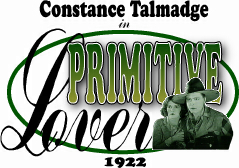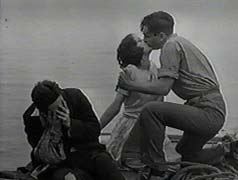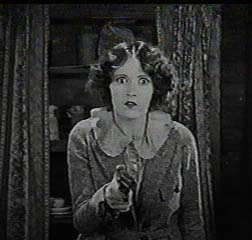

Kevin Brownlow referred to Constance Talmadge as "a brilliant comedienne," which she is in this pleasant little comedy. Yes, it is "pleasant" and it is "little," . . . and it is good, very good in fact.
There won't be any superlatives attached to a description of this movie, though, because it isn't the "best" comedy you'll ever see; it isn't the "greatest" story ever put on film: and it doesn't contain the "funniest" gags you'll find in a movie. "The Primitive Lover," in fact, wasn't designed on a series of gags. It is based on a "situation," and is more akin to the situation comedies of radio's heyday or early TV. But situation comedy, probably more so than gag comedy, requires a personality to put it over, and Constance Talmadge, along with a creditable supporting cast, more than fills the bill. As mentioned, she is "a brilliant comedienne," and she is delightful to watch whether she's pouting or angry or romantic or childlike, all of which she exhibits in this film.
The story is based on a simple premise a housewife (Phyllis) wants some romance in her marriage and a husband who is exciting and virile, which her husband (Hector) is not. So, to fill that void in her life, she reads romance novels. It's bad enough her husband has to contend with these fictional heroes, but she was also once engaged to the author of these novels. He, alas, is missing and presumed dead, though. That, apparently, leaves some doubt in the husband's mind whether he's a second choice or someone who can really win her love.
The missing author (Donald) returns, however, claiming it was all a publicity stunt and ready to marry the girl. When he learns that the only man who knew about the ruse (Hector) has married his beloved, he obviously feels betrayed. The wife feels betrayed, too, since the husband married her while continuing to let her think his rival suitor was dead.
See, there's more to this story than one would think even a little psychology thrown in for good measure!
So,with all this drama, what about the humor? It's there,
most often subtle and downplayed, but it's there. For example, the opening sequence has Talmadge, Ford and
Harlan adrift at sea. Harlan's character is willing to throw himself
into the sea so the husband and wife, portrayed by Ford and Talmadge,
can have enough water to see them through. All he asks is a kiss
from Talmadge. Ford's character agrees and turns his head while
the deed is done. After a moment, he turns to look, but recoils
crying, "Enough! Enough! You're putting my endurance to a
cruel test!" And as for the histrionics of the three
well, you really oughta see it for yourself!
there. For example, the opening sequence has Talmadge, Ford and
Harlan adrift at sea. Harlan's character is willing to throw himself
into the sea so the husband and wife, portrayed by Ford and Talmadge,
can have enough water to see them through. All he asks is a kiss
from Talmadge. Ford's character agrees and turns his head while
the deed is done. After a moment, he turns to look, but recoils
crying, "Enough! Enough! You're putting my endurance to a
cruel test!" And as for the histrionics of the three
well, you really oughta see it for yourself!
Another scene gains much of its humor from the unexpected. On the night of his divorce, Hector has become so disgusted with Donald Wales and his novels that he picks up one of the books and heaves it out the window. A rather large Indian squaw catches the book square on the side of the head and begins ranting and raving. Hector goes outside to apologize, but she begins hitting him. Along comes a large, stern, pipe-smoking Indian, obviously the squaw's husband. Just as we think Hector is going to get his "come uppance," for hitting the squaw with the book, the Indian grabs the squaw, throws her to one side and, for good measure, attempts to kick her in the rear end as she departs. This leads to a friendship with the Indian Chief and the idea that sets up the rest of the story.
Hector does a believable job of kidnapping Phyllis and Donald, although we wonder where this milquetoast husband learned to handle a gun and ride a horse. His expertise with a gun is a little surprising, for example, when Phyllis balks at being herded up the mountain at gunpoint. The masked Hector moves one step closer to her, masterfully twirls the gun in his hand, and pushes it closer to her mid-section. The "twirling" trick apparently had the desired effect, and she and Donald do what they are told.
Of course, we know that everything else is being coordinated from behind the scenes by the Chief. Donald has a freshly killed deer and has a sumptuous meal prepared, but these, unknown to Phyllis and Donald, were accomplished by the Chief.
One of the most enjoyable aspects of this part of the movie is the scenery. As Hector watches the car wind around the mountain, we have a beautiful vantage point from high on the hillside looking down. Also, the vista beyond the cabins where Hector has taken them hostage is worthy of some of the best cinematography of the period.
The story begins with a little humor mixed with a good dose of drama, then moves almost entirely toward humor, but, for the climax, we have a few moments of tense, anxious excitement. When "Roarin' Bill" and Pedro first come into the cabin with Phyllis, we don't know what to expect, and this provides us with our first "anxious" moments, although we learn later that "Roarin' Bill" is not really a bad guy, after all. A few moments later, we are at our most anxious when Pedro returns in the pouring rain to the cabin. All alone with Phyllis, we don't know what nefarious deeds he has in mind!
All of this is provided in just the right doses and mixture making for a more enjoyable film viewing experience.
And, as mentioned before, this type of story must have the right personalities to carry it, and "The Primitive Lover" is darn near perfect casting.
Constance Talmadge is delightful as the naïve, somewhat
silly, discontented housewife who yearns for the romance of the novels she reads. For example, when she and
Donald are kidnapped and left to fend for themselves in the cabin,
her reaction is, "Isn't this romantic?"
the romance of the novels she reads. For example, when she and
Donald are kidnapped and left to fend for themselves in the cabin,
her reaction is, "Isn't this romantic?"
There is warmth to her character, too, because it becomes obvious to us that she doesn't want to divorce Hector and tries a couple of times to get him to say as much, although he doesn't seem to understand. He pitifully believes he's not man enough to win her love.
Harrison Ford quite often played the foil for female comedians, but it is Constance Talmadge with whom he appeared the most, in over a dozen comedies. In 1920, he said of her, "She's great! I made ten straight pictures with her, and each one was a holiday. She is the squarest girl to work with you ever saw! Constance has a distinctive gift for always keeping her comedy on a high, sparkling plane, and she has created a wonderful screen personality. Her characters are sweet, refreshing, and straightforward, just like the girl, herself. Gee , but I miss that child!"
If the results of "The Primitive Lover" are any indication, it's easy to see why Ford and Talmadge collaborated on so many pictures. Ford is excellent at the somewhat "wimpy" husband. He is just as believable as the more determined and manly Hector of the latter part of the film. Not once does he lose our support and sympathy as we are "rooting" for him all the way to win Phyllis back.
This is partly due to the acting of Kenneth Harlan, a somewhat underrated actor (Ford is too, for that matter) who performed well throughout the silent era. He does exceptionally well in the part of the pushy, presumptuous, slightly egotistical Donald Wales. He doesn't do anything in particular to make us dislike him, but the self-assurance he displays doesn't set well with us. Besides, Ford makes such a wonderful underdog, we enjoy seeing him come out on top in the end.
And no less credit should go to Joe Roberts, who plays "Roarin' Bill" (remember him as the nemesis in so many Buster Keaton films?), and Charles Stevens, who plays Pedro (he appeared in almost every Douglas Fairbanks film from 1920 forward.)
Roberts is at first menacing and then comical as the blustering "Roarin' Bill." During the scene in the cabin when Phyllis cooks hot cakes for them, Bill tries his best to tear the leathery hot cakes apart to no avail. Then after drinking her terrible coffee, he says, "Sufferin' wildcats! No wonder we found you alone. I suppose the man's dead you been cookin' for!" Later, when Hector bursts in, guns drawn, Bill takes one of the hot cakes, throws it up on his shoulder and says, "The lady made 'em. Shoot, man. They're bullet-proof!"
Stevens, too, is perfect in his role as Pedro - sneaky, distrustful, and leering enough to make you shiver and send your heart a little higher in your chest when the light comes back on in the lonely cabin and we see him standing in the shadows!
Finally, comments on this film wouldn't be complete without mentioning the print, which is provided by Unknown Video from the Blackhawk collection. The print quality is superb throughout, very sharp and clear. The icing on the cake, too, is the addition of an excellent Bob Vaughn organ score.
With a combination of a good story line, more than likable performers, great print quality and a super musical score, what more would it take to entice someone to see this film?
Return to "The Primitive Lover" page
copyright 1999 by Tim Lussier, all rights reserved